
International Journal of Maritime Engineering
Scope & Guideline
Navigating the Future of Maritime Innovation
Introduction
Aims and Scopes
- Maritime Structural Engineering:
Research and development of structural designs for ships and offshore installations, focusing on safety, reliability, and performance under various conditions. - Marine Systems and Technology:
Exploration of advanced technologies and methodologies in marine systems including propulsion, monitoring, and automation, with a particular emphasis on sustainable practices. - Hydrodynamics and Fluid Mechanics:
Investigation into the fluid dynamics surrounding marine vessels, including cavitation, drag reduction, and the interaction of waves with ship structures. - Maritime Safety and Human Factors:
Analysis of human factors affecting maritime operations, safety management, and accident prevention, striving for improved training and operational protocols. - Environmental Impact and Sustainability:
Research on the environmental implications of maritime activities, including emissions, fuel alternatives, and the development of low-emission vessels. - Computational and Experimental Methods:
Utilization of computational fluid dynamics (CFD), machine learning, and experimental testing to enhance maritime engineering practices and decision-making.
Trending and Emerging
- Digitalization and Smart Technologies:
The rise of digital twin technologies, machine learning, and smart monitoring systems in ship design and operation is gaining attention, reflecting the industry's move towards Industry 4.0. - Sustainable Shipping Practices:
Increasing focus on environmentally friendly designs and alternative fuels, as well as strategies for reducing emissions, highlights the industry's commitment to sustainability. - Autonomous and Remote-Controlled Vessels:
Research on autonomous vessels and their integration into the maritime industry is expanding, addressing the operational and regulatory challenges associated with these technologies. - Advanced Computational Methods:
There is a growing trend towards the application of sophisticated computational techniques, including machine learning and advanced simulations, to tackle complex maritime engineering problems. - Human Factors and Ergonomics in Maritime Operations:
An increasing emphasis on understanding the impact of human factors on maritime safety and efficiency reflects a broader recognition of the role of crew performance in maritime operations.
Declining or Waning
- Traditional Shipbuilding Techniques:
Research related to historical shipbuilding methods and materials, such as wooden boatbuilding, has decreased, possibly due to a greater emphasis on modern engineering practices and materials. - Conventional Maritime Navigation:
Papers focusing on traditional navigation methods and equipment are becoming less frequent, as the industry shifts towards advanced technologies such as GPS and autonomous systems. - Basic Structural Analysis:
There is a noticeable decline in publications centered on basic structural analysis techniques, as more complex and integrated approaches are being favored in current research. - Static Simulation Models:
The focus on static simulation models for maritime operations is waning, giving way to dynamic and real-time modeling approaches that better reflect the operational environment.
Similar Journals

Transactions on Maritime Science-ToMS
Connecting Ideas, Shaping Maritime SolutionsTransactions on Maritime Science-ToMS is a distinguished journal published by the FAC MARITIME STUDIES in Croatia, dedicated to the exploration and dissemination of cutting-edge research across multiple disciplines within maritime studies, including Automotive Engineering, Law, Ocean Engineering, Transportation, and Water Science and Technology. Since its inception, this journal has made significant strides in impacting these fields, as evidenced by its recent Scopus ranks and impressive quartile classifications, with recognitions in Q2 and Q3 across various categories. The journal operates on an open-access model, enhancing the visibility and accessibility of important research findings to professionals, researchers, and students alike. In an era where maritime challenges are at the forefront of global discourse, ToMS aims to foster interdisciplinary communication and innovation to address pressing issues in maritime science and engineering. As such, it serves as a vital resource for advancing knowledge and promoting best practices within both academic and applied contexts.
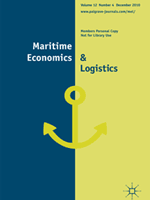
Maritime Economics & Logistics
Transforming Challenges into Solutions in Maritime Economics.Maritime Economics & Logistics, published by Palgrave Macmillan Ltd, is a premier journal in the field of maritime studies, focusing on the intersection of economics, logistics, and transportation. With an impressive impact factor and positioned within the Q1 quartile for *Economics, Econometrics and Finance (miscellaneous)* and Q2 in *Transportation*, this journal is recognized as a beacon of scholarly excellence. Spanning from its inception in 1999 to present, it aims to provide insightful analyses and innovative solutions to the challenges faced by the maritime industry, making it an essential resource for researchers, professionals, and students. With Scopus rankings that place it among the top-tier journals in both *Economics* and *Social Sciences*, it fosters a collaborative environment for the dissemination of cutting-edge research and practical developments in maritime economics and logistics. Join a vibrant community of scholars and enhance your understanding of this critical field.
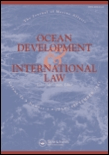
OCEAN DEVELOPMENT AND INTERNATIONAL LAW
Charting the Course for International Ocean LawOCEAN DEVELOPMENT AND INTERNATIONAL LAW, published by Taylor & Francis Inc, is an esteemed journal dedicated to the interdisciplinary study of ocean governance, environmental law, and international relations concerning marine resources. With an ISSN of 0090-8320 and an E-ISSN of 1521-0642, this journal serves as a vital platform for researchers, legal scholars, and policymakers interested in the evolving challenges of ocean development in a globalized context. The journal has established itself as a resourceful publication, evidenced by its ranking in the 2023 Scopus categories, where it is positioned in the 75th percentile for Law and the 66th percentile for Political Science and International Relations. Operating for over four decades, from 1973 until 2024, it is pivotal for advancing knowledge and fostering dialogue on critical issues such as environmental sustainability, international maritime policies, and legal frameworks governing the seas. Despite being a subscription-based journal, OCEAN DEVELOPMENT AND INTERNATIONAL LAW remains influential, offering significant insights that contribute to the development of effective legal instruments and governance strategies for oceanic resources.
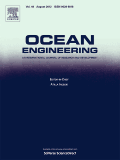
Ocean Engineering
Bridging Theory and Practice in Ocean EngineeringOcean Engineering, published by PERGAMON-ELSEVIER SCIENCE LTD, is a prestigious peer-reviewed journal that has been at the forefront of marine sciences since its inception in 1968. With an impressive impact factor and recognition in the Q1 quartile of both Environmental Engineering and Ocean Engineering, it stands as a key resource for researchers, professionals, and students alike. This journal focuses on a wide range of topics relevant to the field, including coastal engineering, marine resource management, and ocean dynamics, aiming to bridge theoretical research and practical applications. As ranked 14th in Ocean Engineering according to Scopus, it reflects the influential contributions of its articles and provides a platform for innovative discoveries that advance the field. Although not open-access, it offers diverse subscription options for accessing cutting-edge research. The journal’s ongoing legacy of publishing high-quality research continues to contribute significantly to the advancement of knowledge in ocean-related engineering disciplines.
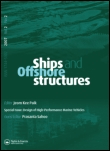
Ships and Offshore Structures
Advancing Innovation in Maritime Design and OperationsShips and Offshore Structures, published by Taylor & Francis Ltd, is a premier academic journal dedicated to advancing research in the fields of mechanical and ocean engineering. With an esteemed ISSN of 1744-5302 and an E-ISSN of 1754-212X, this journal has established a strong reputation, reflected in its Q2 ranking in both the Mechanical Engineering and Ocean Engineering categories, as well as its impressive Scopus rankings. The journal provides a platform for the publication of high-quality, peer-reviewed articles that address innovative design, construction, and operational challenges faced in the maritime and offshore industries. Although the journal does not currently offer open access, its accessibility through institutional subscriptions ensures that it remains a valuable resource for researchers, professionals, and students alike. By fostering interdisciplinary dialogue and disseminating cutting-edge research, Ships and Offshore Structures plays a crucial role in shaping the future of marine technology and engineering practices on a global scale.
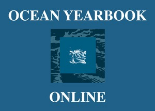
Ocean Yearbook
Advancing Understanding of Maritime Challenges and SolutionsOcean Yearbook, published by BRILL, is a leading academic journal in the field of maritime law and ocean governance, providing a comprehensive platform for researchers and practitioners in this vital area. With an ISSN of 0191-8575 and E-ISSN 2211-6001, this journal offers valuable insights and critical analyses on contemporary issues affecting the world's oceans, promoting interdisciplinary dialogue among scholars in law, environmental studies, and policy-making. Currently ranked in the Q2 quartile for Law, this journal is positioned among the top-tier publications, reflecting its commitment to academic excellence and relevance. Ocean Yearbook is essential reading for those looking to stay abreast of legal developments and emerging challenges in ocean governance, contributing significantly to policy discussions and academic scholarship worldwide. Its accessibility through subscription, combined with its ongoing commitment to high-quality research, makes it an indispensable resource for students, researchers, and professionals dedicated to understanding and protecting marine ecosystems.
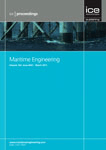
PROCEEDINGS OF THE INSTITUTION OF CIVIL ENGINEERS-MARITIME ENGINEERING
Advancing Sustainability in Maritime Engineering.PROCEEDINGS OF THE INSTITUTION OF CIVIL ENGINEERS-MARITIME ENGINEERING, published by Emerald Group Publishing Ltd, is a leading journal in the field of Maritime Engineering. With a reputable ISSN of 1741-7597 and an E-ISSN of 1751-7737, this journal has established itself as a cornerstone for researchers, professionals, and students keen to explore the complexities of ocean engineering. Operating primarily from the United Kingdom, it has made significant contributions to the advancement of the maritime industry since its inception, covering research from 2001 to 2024. The journal currently holds a Q3 ranking in Ocean Engineering as classified by Scopus, where it ranks 21st among 105 journals in the category, placing it in the 80th percentile, which highlights its influence and relevance in contemporary marine research. Through a rigorously peer-reviewed process, the journal publishes innovative and high-quality articles that encompass broad aspects of maritime engineering, including design, construction, and sustainability, thus serving as a vital resource for those engaged in this dynamic field. By fostering dialogue among professionals and providing access to cutting-edge research, the PROCEEDINGS OF THE INSTITUTION OF CIVIL ENGINEERS-MARITIME ENGINEERING continues to shape the future of maritime engineering practice and education.
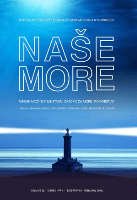
Nase More
Navigating New Frontiers in Environmental ResearchNase More is a prominent open-access journal dedicated to the fields of Ocean Engineering, Process Chemistry and Technology, Water Science and Technology, and Transportation. Published by the University of Dubrovnik, this journal has been disseminating valuable research since its inception in 1994, with a commitment to providing unrestricted access to scholarly work since 2003. The journal boasts a diverse range of submissions that contribute to the advancement of knowledge and innovation within its scope, making it an essential resource for researchers, professionals, and students alike. With a current impact factor reflected in its Category Quartiles as Q4 in Ocean Engineering, Q3 in Process Chemistry and Technology, and Q4 in related fields, Nase More is positioned to meet the evolving needs of its readership. Located in the picturesque city of Dubrovnik, Croatia, this journal not only serves as a platform for rigorous academic inquiry but also fosters collaboration and dialogue among experts in environmental science and engineering disciplines.
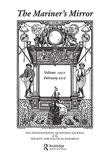
MARINERS MIRROR
Charting the Course of Oceanic ResearchThe Mariners Mirror, published by Routledge Journals, Taylor & Francis Ltd, is an esteemed journal dedicated to exploring the rich intersections of maritime history and oceanographic research. Since its inception in 1911, this periodical has become a vital resource for scholars and professionals alike, offering a platform for high-quality peer-reviewed articles that delve into the historical significance of maritime activities, navigation, and the evolving relationship between humans and the sea. With an ISSN of 0025-3359 and an E-ISSN of 2049-680X, the journal operates under a rigorous academic framework, contributing to its current rankings in Scopus, particularly its Q3 position in History and Q4 in Oceanography as of 2023. Although it does not offer open access, it remains influential in both disciplines, fostering a deeper understanding of our maritime heritage and the environmental challenges faced by our oceans. The Mariners Mirror is essential for researchers, professionals, and students who seek to engage with the historical narratives that shape our contemporary maritime world.

Journal of Marine Science and Technology-Taiwan
Pioneering insights into the marine world.The Journal of Marine Science and Technology-Taiwan, published by Nant Taiwan Ocean University, is a pivotal academic platform dedicated to the advancement of knowledge in the fields of marine science and engineering. With an ISSN of 1023-2796 and E-ISSN 2709-6998, this journal spans a wide array of topics relevant to the study and application of marine technology from 1998 to 2024. It ranks in the Q3 quartile in major categories such as Mechanical Engineering, Mechanics of Materials, and Ocean Engineering, illustrating its growing influence and the breadth of research it encompasses. Although currently not an open access journal, it provides critical insights to researchers, professionals, and students alike, making significant contributions to the understanding of marine environments and technologies. As the journal continues to evolve, its commitment to high-quality, impactful research remains central to its mission, empowering scholars to drive innovation in the dynamic field of marine science.